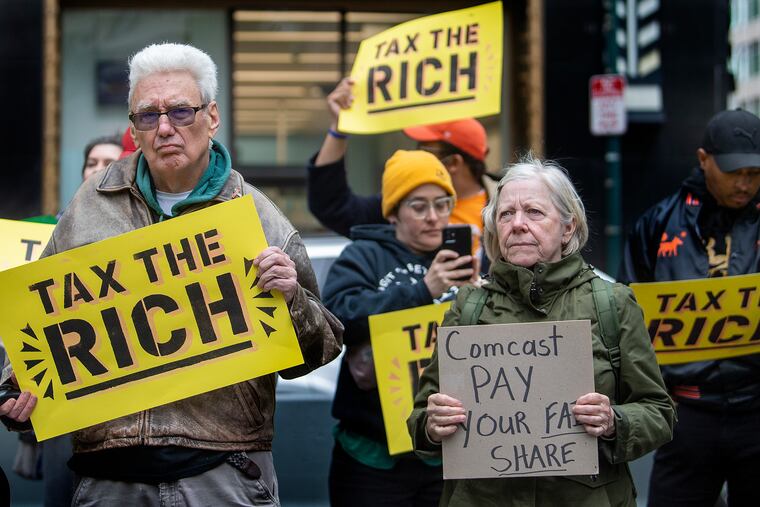Philly is finally cutting taxes. It’s about time.
For a city government that often sees more taxes as the answer to everything, the recent decreases in wage and business taxes represent a monumental — and welcome — shift.

For years, taxes only went one way in Philadelphia: up. Since Mayor Frank Rizzo and City Council jacked the wage tax up to 4.3% in 1976 (the highest in the country, which it still is), reductions have been few and far between. The tangle of business taxes also makes life harder for small businesses across the city.
But last week, in a late-breaking budget compromise, City Council agreed to cut both the wage tax and the Business Income and Receipts Tax (BIRT). The wage tax for residents will now drop to 3.79% (and 3.44% for nonresidents) while the BIRT will fall to 5.99%, the first time in 34 years that it has been below 6%. Lawmakers have also taken steps to mitigate the expected increase in property taxes following the recent reassessments, extending some relief to homeowners.
» READ MORE: ‘It’s a start’: City Council cuts Philly’s wage and business tax rates in a win for diverse chambers of commerce
For a city government that often sees more taxes as the answer to everything, this is a monumental shift.
One ironclad rule of taxation is that if you tax something, you will get less of it. Sometimes the effect is minor: Raising the tax on wages by 0.01% will not drive many people to move out of the city, though it may be the straw that breaks the camel’s back for a handful of discontented residents, especially now that remote work is more possible. Raising it by a full percentage point, on the other hand, would send many of those who are able fleeing to the suburbs or to other cities. But whatever the amount, more taxes will change people’s behavior.
“One ironclad rule of taxation is that if you tax something, you will get less of it.”
City Council knows this. The evidence is in its justification for the various “sin taxes” it imposes. The 1.5 cents per ounce tax on soda was intended to raise revenue, but also to get people to drink less soda. The tax on tobacco was supposed to reduce smoking as it added funds to the city coffers. So, when lawmakers reduce taxes on businesses and wages, they know, too, that they are making the city a more attractive place to live and work.
A diverse collection of business owners supported the change: The African-American Chamber of Commerce of Pennsylvania, New Jersey and Delaware, the Greater Philadelphia Hispanic Chamber of Commerce, the Asian American Chamber of Commerce of Greater Philadelphia, the Independence Business Alliance/LGBTQ+ Chamber of Commerce, and the Greater Philadelphia Chamber of Commerce all praised the move.
There are, inevitably, some members of City Council who doubt the wisdom of the move. Councilmembers Helen Gym, Kendra Brooks, and Jamie Gauthier all voted no on the wage and business tax cuts. That is not surprising.
In 2020, Brooks and Gym proposed a tax on intangible personal property — which mostly includes stocks, bonds, mutual funds, and other financial instruments. The scheme was constitutionally dubious, but even beyond that, it was a bad idea. Why? Because it is ridiculously simple to move intangible property out of the city. That was part of the reason that a previous version of this tax was repealed in 1997: Banks had shifted the management of trusts to suburban offices, thus easily avoiding the tax while also depriving the city of those jobs.
Philadelphia’s small size plays a role here. It is the largest county in the state by population, but the second smallest in geographic area. Normally that does not matter, but in taxation it does. A business that feels overburdened by the vast collection of city taxes can easily move its offices to the surrounding counties and still reach its customer base in the city.
When the city hiked the tobacco tax in 2013, Mayor Michael Nutter said, “I don’t know that someone is going to flee to the suburbs to get a pack of cigarettes.” But drive down City Avenue or Cheltenham Avenue and count the smoke shops that are just over the border. The taxes may not have chased out all of the tobacco business, but it is impossible to say with a straight face that it had no effect. Philadelphia’s loss was the suburbs’ gain.
Wage taxes and business taxes do the same thing. People don’t change their residences lightly, but given enough negative pressure, they will ultimately move away from a place that actively makes their lives more expensive. It also leads to some unpleasant truths: As much as City Council would love to solve its annual budget crises by soaking the rich, no one has an easier time moving than wealthy people. A millionaire with a vacation home in Florida can more easily relocate there than the average Philadelphian. That is unfair. It is also true.
So Council is making a hard choice but the right decision when it lowers taxes on people and businesses (which can leave) and raises them on property (which can’t). There are many reasons why people and businesses leave the city, not all of them related to tax. But a majority on City Council seems to be waking up to the fact that taxes affect behavior. They deserve credit for finally doing something about it.
Kyle Sammin is editor-at-large at Broad + Liberty.